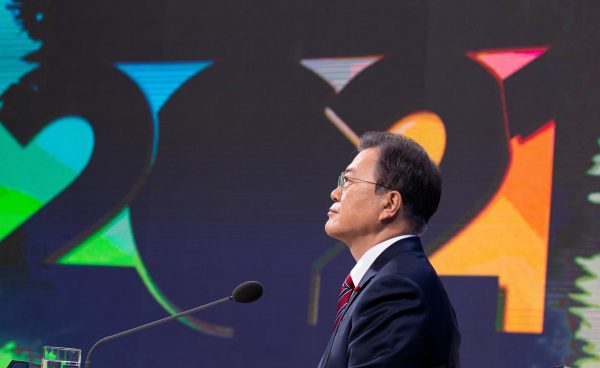A more important question is how receptive Biden will be to the weight Moon will want to give jump-starting stalled US–North Korea talks. Despite lingering hopes in the Moon government that Biden will opt to re-engage fully with North Korea, Biden is unlikely to focus like a laser on North Korea.
While the Moon government’s overarching stance is to support US efforts in reaching a landmark nuclear deal with North Korea, what the Biden administration really wants to see from its ally is for Seoul to expand its global footprint as a critical middle power. Unlike any other time in their alliance, the time is ripe for South Korea to bolster its international role on issues such as climate change, the multilateral pandemic response, restructuring the free trade regime and enhancing coordination and cooperation between so-called techno-democracies. On all these issues, South Korea can make vital contributions when the United States needs crucial input from major allies in Asia and Europe.
China has made strides in most of the manufacturing sectors where South Korea has traditionally dominated, such as shipbuilding, consumer electronics and computer chips. The only way that South Korea can maintain an edge is by becoming more innovative than China. Crucially, as a vibrant democracy with a robust alliance with the United States, South Korea can enhance its global leverage by expanding the scope of this alliance. The real question confronting the Moon government is whether it has the strategic bandwidth to revamp the alliance as the Biden administration begins to grapple with constraining Chinese power and influence or whether it will continue its emphasis on elusive breakthroughs with North Korea.
Biden entered office with a full foreign policy plate and will only begin to implement his own North Korea policy after his administration conducts a thorough policy review. For the time being, the lion’s share of Biden’s attention is going to be on the increasingly fraught US–China relationship, the hurdles of re-joining the Iran nuclear accord and resetting ties with Moscow. Despite the resounding assurances that America is back—in a more recognisable way—Biden’s presidency is unlikely to fundamentally alter the global balance of power in a way that will fully restore US supremacy. Given his decades of experience as a senator and vice president, the last thing Biden will do is restart the erratic, dangerous, self-serving and ill-prepared North Korean adventures initiated during Donald Trump’s term.
President Moon, however, is hoping that Biden will at least come half-way in fostering renewed engagement with Kim Jong-un. It’s not clear how realistic this expectation is. Even Trump walked away from a half-baked deal at the second US–North Korea summit in Hanoi in February 2019. Trump’s then-national security advisor John Bolton subsequently described Moon’s ideas on denuclearisation with North Korea as ‘schizophrenic’ and ‘nonsense’.
Undaunted, South Korea’s new foreign minister and former national security advisor, Chung Eui-yong, has suggested that North Korean denuclearisation is entirely possible if the right constellation of security commitments are aligned. Chung played a key role in the inter-Korean summits in 2018. In February, at his confirmation hearings, he declared his belief that Kim Jong-un was sincere in his quest for denuclearisation subject to absolute guarantees of security on the peninsula. Chung has also reaffirmed the Moon government’s aversion to restarting large-scale military exercises with the United States.
Moon’s fixation on putting into place a so-called permanent peace regime on the Korean peninsula is all the more urgent given that he will leave office in May 2022. All presidents want to leave legacies that will outlast their years in office and Moon is no exception. But as the world grapples with the worst pandemic in a century, it makes eminent sense for South Korea to look beyond North Korea as the defining element in Seoul’s national security and foreign policies. There is every reason to maintain the highest level of vigilance and defence-readiness in the face of growing North Korean nuclear and other asymmetrical threats. But in an era of escalating power competition—marked by intensifying US–China rivalries that will cut across all sectors, worsening climate change, unparalleled technological disruptions driven by AI, and increasing nationalism—South Korea needs to extricate itself from a North Korea-centric worldview.
A lasting road to peace and prosperity on the peninsula can only be achieved if South Korea amplifies its international leverage by enhancing its contributions to the global commons. This cannot happen if it continues to focus myopically on a peninsular peace regime without taking into account the gross human rights abuses of the North Korean government or crafting a more realistic roadmap towards verifiable denuclearisation. South Korea will also miss out on a key opportunity to strengthen its alliance with the United States at a time when Washington needs crucial support from allies.
As important as the North Korea issue is, Seoul would gain significant dividends by focusing on global areas of cooperation with the United States and mending seriously strained relations with Japan. Globalising South Korean foreign policy should receive bipartisan support. In an era of unprecedented decoupling, but also growing entanglement, it makes sense for South Korea to accentuate its increasingly prominent role as an outward-looking techno-democracy. To do otherwise would be to go back in time and forfeit a rare opportunity to augment South Korea’s strategic regional and global leverage.
Chung Min Lee is a Senior Fellow in the Asia Program at the Carnegie Endowment of International Peace and Chair of the International Advisory Council and the International Institute for Strategic Studies.
This article first appeared in the most recent edition of East Asia Forum Quarterly, ‘Asia after Biden’s election’, Vol. 13, No 1.

